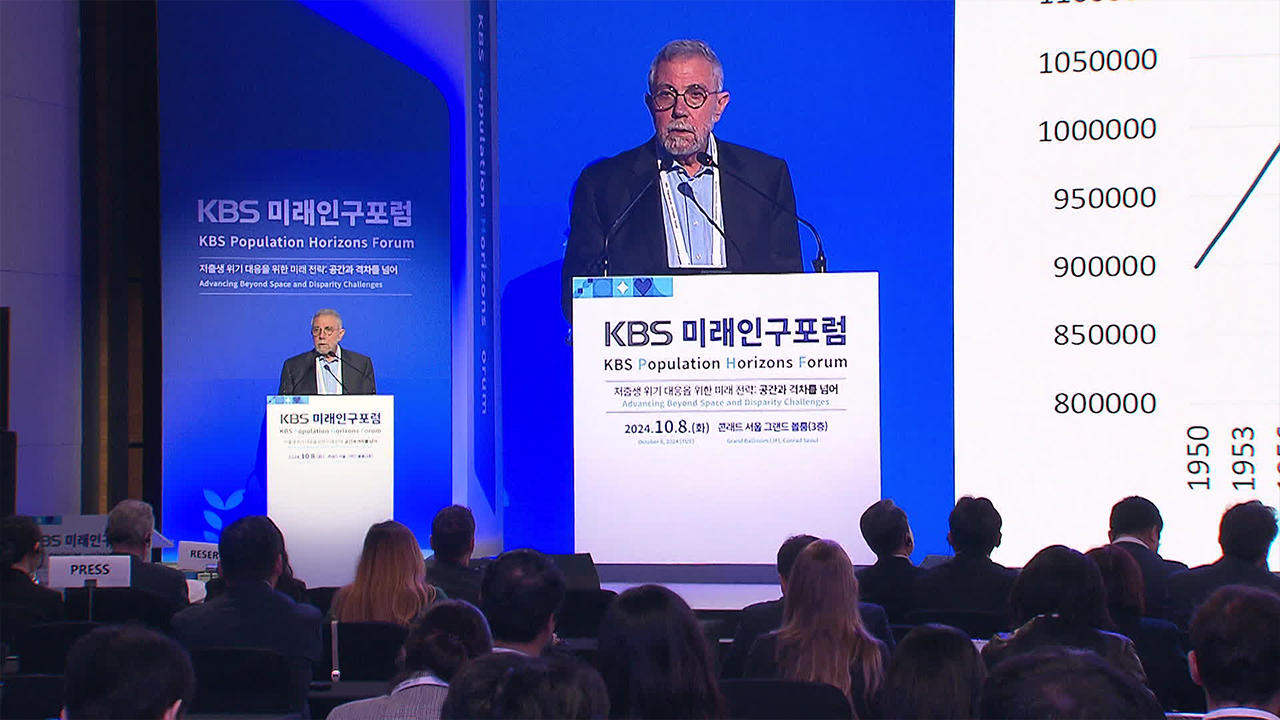KBS ‘Population Horizons Forum’ seeks solutions for S. Korea’s low birth rate
입력 2024.10.09 (00:01)
읽어주기 기능은 크롬기반의
브라우저에서만 사용하실 수 있습니다.
[Anchor]
KBS, the first Korean broadcaster to launch a low birth rate crisis response broadcasting team, held the 'Population Horizons Forum' today (10.8) to seek solutions to the low birth rate issue.
Domestic and international experts pointed to the phenomenon of urban concentration centered around Seoul as the issue and proposed decentralization as a solution.
Reporter Jeong Hae-joo has the story.
[Report]
A time to hear insights from overseas scholars on Korea's record low birth rate phenomenon.
This is KBS's 'Population Horizons Forum,' which launched the 'Low Birth Rate Crisis Response Broadcasting Team' as the first media outlet in the country.
[President Yoon Suk-yeol: "The fundamental solution to the population issue is regional balanced development, and the key to that is education and healthcare. I hope you will present many policies that support the government's efforts through in-depth discussions."]
Nobel laureate in economics, Professor Paul Krugman, specifically pointed to the 'urban concentration phenomenon' as a cause.
He stated that all resources are concentrated in cities, leading to intensified competition and rising housing prices, which in turn decreases the quality of life.
He suggested alternatives such as the United States' 'place-based policies' for regional balanced development.
[Paul Krugman/Distinguished Professor of Economics, City University of New York: "There needs to be a conscious effort to create jobs in underdeveloped areas."]
The German model, which has successfully addressed regional extinction issues by evenly distributing universities and small but strong companies, also received attention.
[Gerhard Schröder/Former Chancellor of Germany: "Decentralization allows for the equal distribution of resources and opportunities, and it also provides opportunities to distribute affordable housing, which is an important issue related to low birth rates."]
Domestic experts mentioned regional innovation centered on megacities and future generations.
KBS plans to actively respond to the low birth rate issue by broadcasting related news and programs during this third 'Low Birth Rate Crisis Response Broadcasting Week'.
This is KBS News, Jeong Hae-joo.
KBS, the first Korean broadcaster to launch a low birth rate crisis response broadcasting team, held the 'Population Horizons Forum' today (10.8) to seek solutions to the low birth rate issue.
Domestic and international experts pointed to the phenomenon of urban concentration centered around Seoul as the issue and proposed decentralization as a solution.
Reporter Jeong Hae-joo has the story.
[Report]
A time to hear insights from overseas scholars on Korea's record low birth rate phenomenon.
This is KBS's 'Population Horizons Forum,' which launched the 'Low Birth Rate Crisis Response Broadcasting Team' as the first media outlet in the country.
[President Yoon Suk-yeol: "The fundamental solution to the population issue is regional balanced development, and the key to that is education and healthcare. I hope you will present many policies that support the government's efforts through in-depth discussions."]
Nobel laureate in economics, Professor Paul Krugman, specifically pointed to the 'urban concentration phenomenon' as a cause.
He stated that all resources are concentrated in cities, leading to intensified competition and rising housing prices, which in turn decreases the quality of life.
He suggested alternatives such as the United States' 'place-based policies' for regional balanced development.
[Paul Krugman/Distinguished Professor of Economics, City University of New York: "There needs to be a conscious effort to create jobs in underdeveloped areas."]
The German model, which has successfully addressed regional extinction issues by evenly distributing universities and small but strong companies, also received attention.
[Gerhard Schröder/Former Chancellor of Germany: "Decentralization allows for the equal distribution of resources and opportunities, and it also provides opportunities to distribute affordable housing, which is an important issue related to low birth rates."]
Domestic experts mentioned regional innovation centered on megacities and future generations.
KBS plans to actively respond to the low birth rate issue by broadcasting related news and programs during this third 'Low Birth Rate Crisis Response Broadcasting Week'.
This is KBS News, Jeong Hae-joo.
■ 제보하기
▷ 카카오톡 : 'KBS제보' 검색, 채널 추가
▷ 전화 : 02-781-1234, 4444
▷ 이메일 : kbs1234@kbs.co.kr
▷ 유튜브, 네이버, 카카오에서도 KBS뉴스를 구독해주세요!
- KBS ‘Population Horizons Forum’ seeks solutions for S. Korea’s low birth rate
-
- 입력 2024-10-09 00:01:04

[Anchor]
KBS, the first Korean broadcaster to launch a low birth rate crisis response broadcasting team, held the 'Population Horizons Forum' today (10.8) to seek solutions to the low birth rate issue.
Domestic and international experts pointed to the phenomenon of urban concentration centered around Seoul as the issue and proposed decentralization as a solution.
Reporter Jeong Hae-joo has the story.
[Report]
A time to hear insights from overseas scholars on Korea's record low birth rate phenomenon.
This is KBS's 'Population Horizons Forum,' which launched the 'Low Birth Rate Crisis Response Broadcasting Team' as the first media outlet in the country.
[President Yoon Suk-yeol: "The fundamental solution to the population issue is regional balanced development, and the key to that is education and healthcare. I hope you will present many policies that support the government's efforts through in-depth discussions."]
Nobel laureate in economics, Professor Paul Krugman, specifically pointed to the 'urban concentration phenomenon' as a cause.
He stated that all resources are concentrated in cities, leading to intensified competition and rising housing prices, which in turn decreases the quality of life.
He suggested alternatives such as the United States' 'place-based policies' for regional balanced development.
[Paul Krugman/Distinguished Professor of Economics, City University of New York: "There needs to be a conscious effort to create jobs in underdeveloped areas."]
The German model, which has successfully addressed regional extinction issues by evenly distributing universities and small but strong companies, also received attention.
[Gerhard Schröder/Former Chancellor of Germany: "Decentralization allows for the equal distribution of resources and opportunities, and it also provides opportunities to distribute affordable housing, which is an important issue related to low birth rates."]
Domestic experts mentioned regional innovation centered on megacities and future generations.
KBS plans to actively respond to the low birth rate issue by broadcasting related news and programs during this third 'Low Birth Rate Crisis Response Broadcasting Week'.
This is KBS News, Jeong Hae-joo.
KBS, the first Korean broadcaster to launch a low birth rate crisis response broadcasting team, held the 'Population Horizons Forum' today (10.8) to seek solutions to the low birth rate issue.
Domestic and international experts pointed to the phenomenon of urban concentration centered around Seoul as the issue and proposed decentralization as a solution.
Reporter Jeong Hae-joo has the story.
[Report]
A time to hear insights from overseas scholars on Korea's record low birth rate phenomenon.
This is KBS's 'Population Horizons Forum,' which launched the 'Low Birth Rate Crisis Response Broadcasting Team' as the first media outlet in the country.
[President Yoon Suk-yeol: "The fundamental solution to the population issue is regional balanced development, and the key to that is education and healthcare. I hope you will present many policies that support the government's efforts through in-depth discussions."]
Nobel laureate in economics, Professor Paul Krugman, specifically pointed to the 'urban concentration phenomenon' as a cause.
He stated that all resources are concentrated in cities, leading to intensified competition and rising housing prices, which in turn decreases the quality of life.
He suggested alternatives such as the United States' 'place-based policies' for regional balanced development.
[Paul Krugman/Distinguished Professor of Economics, City University of New York: "There needs to be a conscious effort to create jobs in underdeveloped areas."]
The German model, which has successfully addressed regional extinction issues by evenly distributing universities and small but strong companies, also received attention.
[Gerhard Schröder/Former Chancellor of Germany: "Decentralization allows for the equal distribution of resources and opportunities, and it also provides opportunities to distribute affordable housing, which is an important issue related to low birth rates."]
Domestic experts mentioned regional innovation centered on megacities and future generations.
KBS plans to actively respond to the low birth rate issue by broadcasting related news and programs during this third 'Low Birth Rate Crisis Response Broadcasting Week'.
This is KBS News, Jeong Hae-joo.
-
-

정해주 기자 seyo@kbs.co.kr
정해주 기자의 기사 모음
-
이 기사가 좋으셨다면
-
좋아요
0
-
응원해요
0
-
후속 원해요
0















이 기사에 대한 의견을 남겨주세요.